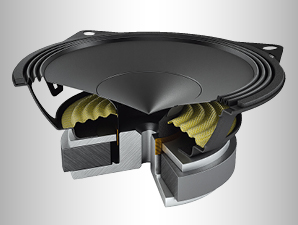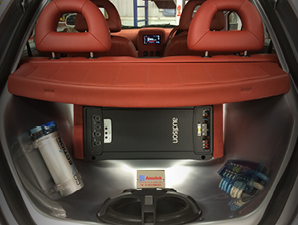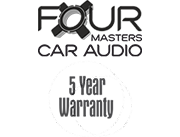Make the most of the time you spend in your car with the latest tech
Radio, CD & MP3 head-units • Low-cost to high-end options • Factory fit and custom builds • Award winning installations
So even if you’ve got no power under the bonnet – why not stick it in the boot instead!
We supply and install the latest technology and leading brands of in-car audio equipment. With over 25 years experience Accutek offer a professional installation service from a simple head-unit and speaker upgrade right through to the complete show winning system with custom boot build. Demo vehicles are available to show our installation capabilities.
We also specialise in the service and repair of all makes and models of in-car audio equipment and, of course, decoding of all OE and aftermarket head-units.



Accu-Tips
So, you think you know all there is to ICE. We have provided a glossary below just in case you want to refresh your knowledge.
AMPLIFIERS
Bass Boost
A control on the amplifier that literally boosts the bass. But be careful not to abuse, as this can dramatically increase distortion.
Cooling Fan
Helps cools the amplifier – when pushed hard amps can get very hot – preventing early shut-down.
DC-DC Converter
A type of power supply used in separate amplifiers that boost the normal 12V available in the car to that required by the amplifier’s main circuitry.
High Level Input
The amp can be connected to a head unit via its speaker outputs.
High Pass
A type of crossover that removes lower frequencies from the signal.
Line Out
Connections used to feed the signal on to other amplifiers. Also known as daisy-chaining.
Low Pass
A type of crossover that removes the high frequencies from a signal.
RCA Inputs
The standard from of connection for audio signals in a car. On ahead unit, the matching connections can also be called pre-amplifier outputs.
Subsonic Filter
This is not the same as a subwoofer crossover, but removes extremely low frequencies that can put strain on both the amp and speaker, and yet will not be heard.
Thermal Protection
A built-in circuit that turns off the amp before it gets too hot, preventing damage.
Noise Suppressor
A unit to remove noise induced into the cables between in your system.
SPEAKERS
Active Crossover
This is installed in the signal path before the amplifier and basically does the same job as the passive crossover. This means you’ll need more channels of amplification but there are benefits in terms of sonic performance, set-up flexibility and durability.
Motor Assembly
Much as it sounds, the motor assembly is what powers the cone or diaphragm of the individual drive unit. A coil of wire held in a magnetic field is fed with the electrical signal which causes the coil and attached cone to move. It is in the voice coil that most speaker failures occur due to overheating, especially when the electrical signal becomes distorted.
Passive Crossover
This divides the signal into bands to be fed to the individual drivers in a system. It is either installed into the speaker cables or, in its most simple form, appears as a capacitor fitted to the back of the speaker. More upmarket passive crossovers have different terminals or switching to adjust the levels between the bands.
Sensitivity
This is a measure of how much you get out for what is fed in. Buying speakers that are more sensitive can save you money on amplification if loudness is your bag.
Tweeter
More commonly a dome as opposed to a cone shape, the smaller tweeters are designed to deliver the higher, treble frequencies.
Woofer
When speakers are made up of more than one driver or cone, the woofer is the largest and deals with the lower, bass frequencies
SUBWOOFERS
Bridged
Means the output of two amplifier channels are configured to produce a single channel with greater power. This is useful when running subs, as they need more power than other speakers
Voice Coil
The length of wire around the former through which current is passed. This is held inside the field of the magnet, acting as a motor and moving the coil.
Dual voice coil
When a speaker has two voice coils wrapped on the same former. There are two sets of positive and negative terminals in this design.
Former
The rigid tube around which the voice coil or coils are wound.
Impedance
The measure of which a circuit resists current flow when a voltage is applied.
Mono
A single channel that can be derived by summing a stereo signal prior to amplification.
NAVIGATION
DVD and CD-Rom
These are discs supplied with the navigation system that contain all of the vital map information. DVD discs have a much larger storage capacity, and also calculate info faster than CD-Rom.
GPS
This stands for Global Positioning System and refers to a group of satellites that transmit signals which can be analysed and processed to find your location. All in-car navigation systems have GPS capabilities and combine them with speed sensors and a gyroscope to calculate distance and direction.
POI
Points Of Interest is the name for the places such as airports, car parks, hotels and restaurants and service stations. You can view POI lists and also select the nearest in relation to your current location.
TMC
This stands for Traffic Message Channel. This is traffic info broadcast directly to the navigation system, allowing it to re-route you to avoid jams without there being any input by the user. It does require a TMC compatible head unit or dedicated receiver to pick up and decoder signals though.
MISCELLANEOUS
Bridgable
Where two channels of an amplifier can be combined to give a more powerful mono signal – handy for single subs.
Changer Controls
The head unit has the relevant software and inputs to operate a CD or MD changer.
DAB
Digital Audio Broadcasting. Designed to replace FM as the standard for radio broadcasting in the UK, it has the usual advantages of a digital format (low noise etc) and allows a lot more stations to be broadcast over a narrower band.
DIN-E
The German standard size for the slot that a head unit fits into, this is used in a lot of vehicles and by all of the car audio manufacturers. Double DIN is twice as high.
DSP
Digital Signal Processor. A device, either stand-alone or built into head units, that modifies the audio signal to optimise the system’s performance. This may include a variety of functions from equalisation, crossovers and time alignment. It can also offer sound presets for different music.
EQ
Equaliser. A more sophisticated form of tone control than normal bass and treble. The more bands it’s got, the more flexible the set-up.
MP3
MPEG Audio Layer 3. A format for compressing and storing audio information. Using MP3, the equivalent of 10 normal CDs can be stored on a single CD-R disc.
Pre-Amp Output
Outputs associated with head units that feed an audio signal into additional amps or signal processors.
RMS
Root Mean Square. The most realistic measurement of the output of an amp. The higher the figure, the more powerful the unit. It should be quoted with the amount of distortion.
Speaker Level Input
Amps with this facility can take the audio signal from a head unit that doesn’t have pre-amp outputs, but instead uses the speaker outputs.
SPL
Sound Pressure Level. A measurement of loudness, rated in dB or decibels. This is a logarithmic unit, so 100dB doesn’t mean twice as loud as 50. It takes twice the power to increase output by 3dB.
Sub Output
This is an RCA pre-out to feed a powered sub or a dedicated amp. A bonus for head units with built-in sub crossovers is that you can tweak the sub level from your seat. This output is also unaffected by the fader control.
CD-R/RW Compatible
This means the head unit can play CDs made with a CD-R recorder. RW types can be copied and edited repeatedly.
Crossover
A device that splits the audio signal and sends it to the suitable speakers: bass to subwoofers, treble to tweeters etc.
Efficiency
This is used to describe the performance of speakers. It relates to how much sound you get out for the power put in.
Roll Off
This means the point or rate at which output reduces in comparison to frequency.
Time Alignment
A system that digitally delays the audio signal to individual speakers, greatly improving the stereo effect.
Thatcham Cat 1 Compliant
This is a vehicle alarm/immobiliser product which has met and passed Thatcham category 1 testing criteria. Insurance companies will often give discounts if you have a correctly installed and certified Thatcham device.
Thatcham Cat 2 Compliant
A vehicle immobiliser product, which has met and passed the Thatcham category 2 testing criteria.
Tri-Mode operation
This enables three channels to be run from a two-channel amplifier (left, right and subwoofer) using a simple passive crossover.

